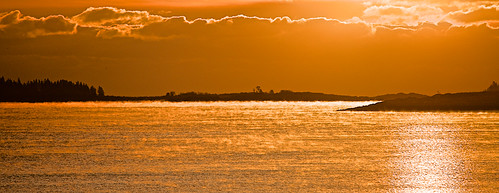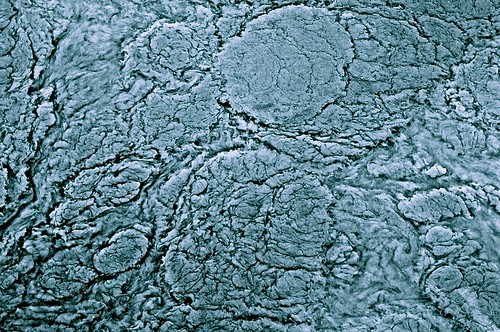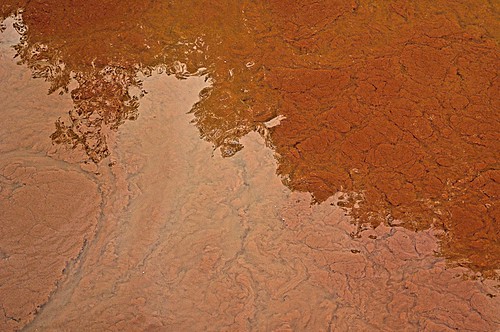Glooscap, who lived on Cape Blomidon at the base of Cape Split...
...
Cape Split to Parrsboro Shore is (only) 5km
...
Minas Basin also contains about 1,330 hectares of low salt marsh, almost 80% of which is concentrated around the Southern Bight,
...
At Avonport, Grand Pré, and Hortonville, "drumlins", low elongated mounds of rocks and clay, shaped like half an egg and formed during the passage of heavy ice sheets, attest to the presence of glaciers more than 12,000 years ago. The Triassic sandstones contain an iron-rich binding material (haematite) that gives them their characteristic deep red colour. This oxidises and crumbles on exposure to air, allowing the coast to erode rapidly. The released sand and silt wash onto the tidal flats to form wide beaches, mudflats and broad salt marshes cut by deep river channels. The northern shore of the Basin consists of a discontinuous chain of high, basalt bluffs and rocky islands, fronted by broad tidal flats.
...
During the notorious "Saxby Gale" of 1869, a deadly combination of high tide, gale force winds and low atmospheric pressure lifted the sea at the head of the Basin to a remarkable 21.6 metres, causing massive flooding and devastation.
...
more than 10 cubic kilometres of seawater, weighing 10 billion tonnes, to flow into and out of the Basin twice daily, more than forty times the flow of the St. Lawrence River
...
The burrowing amphipod Corophium volutator crowds the mudflats of the Southern Bight, with up to 60,000 rice-sized animals per square metre.
...
The high tidal range was ideally suited to the weir fishery, which for generations was the most popular harvest method.
...
It has been estimated that only about one and half percent of the Basin's extensive tidal flats, or about 445 hectares, have the ideal mix of sand and mud for prime clam habitat. The most productive clam flats are located along the northern shore of the Basin, particularly between Five Islands and Bass River. In recent decades, production has once again declined,
...
Waterfowl and shorebirds. The critical importance of the mudflats as foraging areas for millions of migrating sandpipers ... Evangeline Beach, for example, is world famous for the awesome summertime aerial ballets by flocks of tens of thousands semipalmated sandpipers.
...
Fundy tidal power. The engineers have not lost interest, but are simply awaiting a more favourable economic climate. ... It is only a matter of time before interest in tidal power development revives, and its profound social, economic and ecological consequences will have to be examined.







